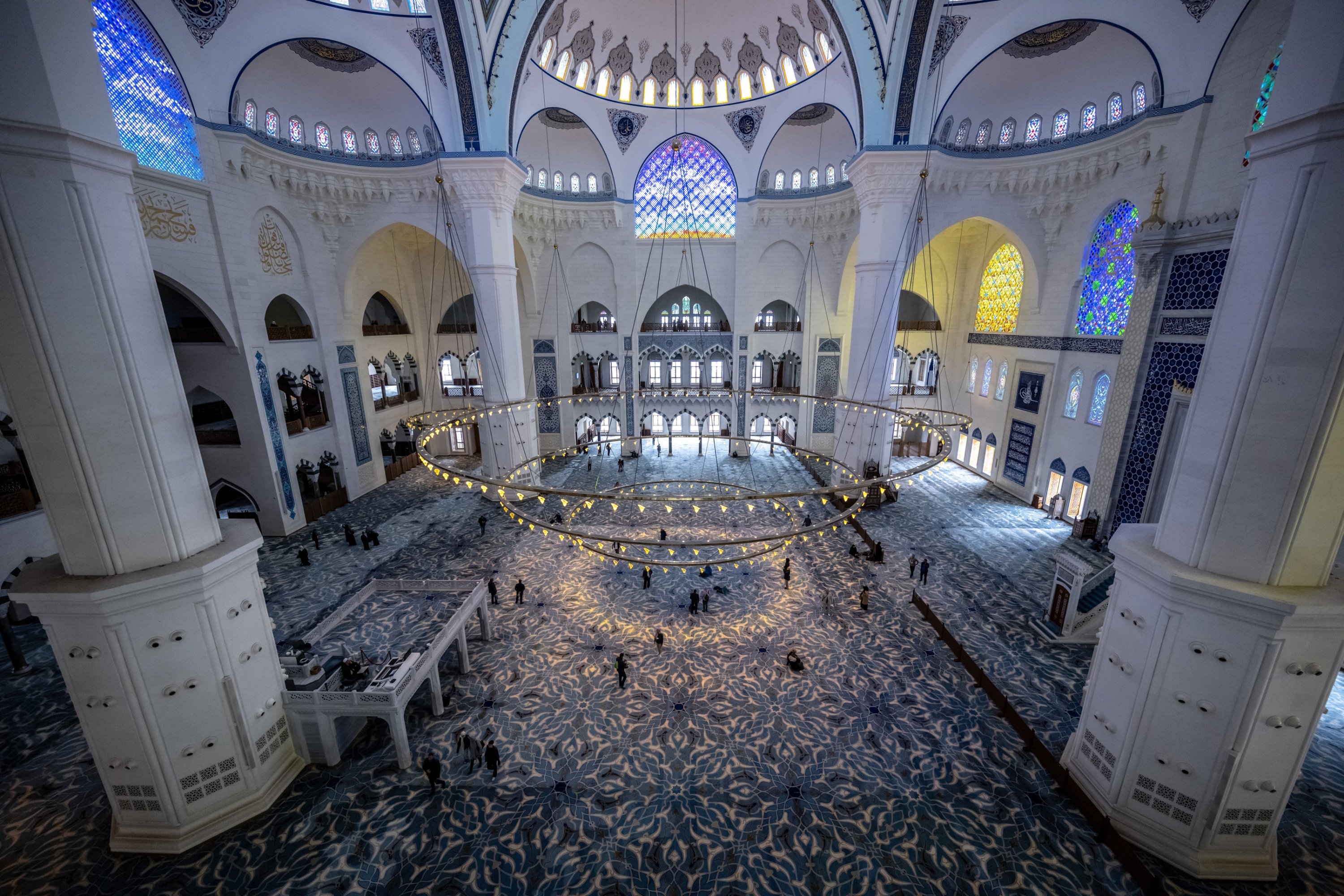© Turkuvaz Haberleşme ve Yayıncılık 2026
The Grand Çamlıca Mosque, which draws attention with its magnificent architecture, carries the distinction of being Türkiye's most modern mosque complex, not only as a grand place of worship but also as an art gallery, library, conference hall, art workshop and the Museum of Islamic Civilizations. It evokes the continuity of the Seljuk mosques from the moment one steps inside, with its location on the Anatolian side making it an integral part of Istanbul's skyline, blending the Ottoman-Seljuk architectural style with contemporary lines.
Five years have passed since the opening of the Grand Çamlıca Mosque, which has become a significant part of Istanbul's silhouette due to its location on Çamlıca Hill and its aesthetic and majestic structure that captures attention.
The pinnacle, consisting of three parts and colored with nanotechnology, holds the distinction of being the world's largest. The Çamlıca Mosque also boasts one of the world's largest place of worship doors, measuring 5 meters (16.4 feet) wide, 6.5 meters high and weighing 6 tons (12,000 pounds).
The mosque also showcases its distinction through its acoustics, sound systems, lighting, heating, ventilation and security systems.

Ergin Külünk, president of the Çamlıca Mosque and Education Culture Services Association, told Anadolu Agency (AA) that their story became public with President Recep Tayyip Erdoğan's 2012 statement, "We will also build a grand mosque in Çamlıca."
Külünk, describing the mosque's preparations, architectural design competition, and construction stages, noted that they officially opened the mosque on May 3, 2019, with the participation of President Erdoğan, guests from Islamic countries and Türkiye, and citizens, following 60 months of work.
Külünk mentioned that the mosque can accommodate 25,000 people indoors and about 65,000 people in total with its inner and outer courtyards for congregational prayers, adding that even during the COVID-19 pandemic, 10-15,000 people prayed while adhering to distancing rules.
Regarding initial criticisms of the mosque's construction, Külünk stated that those had faded away, highlighting that they considered all reasonable and logical evaluations. He emphasized that in 2019, the entire country witnessed 70,000 people praying Fajr (morning) prayer there, clarifying that it was not just a neighborhood mosque but designed as a Friday mosque. He stressed that they didn't just build a mosque there but, following the president's instructions, created a complex with a museum, conference hall, art gallery, library and art workshops, combining traditional concepts with modern sensibilities, making it a "complex" in both traditional and modern terms.

Külünk, discussing their efforts regarding the mosque's impact on the city's skyline, said: "We imagined how our project would enhance the city's skyline from both the Anatolian and European sides. With time, it became clear that our vision for this grand monument's positive impact was justified. We aimed to bring the historic silhouette to the Anatolian side, visible as you navigate from the Sea of Marmara into the Bosporus. Now, it seamlessly blends into the surroundings, with many remarking that it feels like a timeless addition to the city."
Külünk mentioned that they receive around 100,000 visitors weekly and approximately 5 million annually. With the completion of the Altunizade-Bosna Boulevard Metro Line, accessing the mosque will become significantly easier, increasing visitors.
He noted that visitors come not only from Istanbul and Türkiye but also from various parts of the world.
"We have two types of visitors. Muslims from all over the world come to our mosque to pray. We also receive local and foreign tourists who visit just for sightseeing. Their numbers are quite significant. We periodically meet with mosque staff and tour guides. So far, we haven't heard any negative comments. We've only heard favorable expressions. Tourists from South America to Asia, from the Far East to the most remote parts of Africa and Russia, visit and admire our complex. Our mosque and museum are on the lists of places to visit for tourism companies. Local and foreign tourists visit our mosque and museum via tour buses," he said.
Since its opening on April 8, 2022, the Museum of Islamic Civilizations has become one of the most important parts of the complex with its collection of over 600 valuable artifacts.
Located in a total enclosed area of 10,000 square meters, the museum showcases over 600 artifacts reflecting the historical development of Islamic art from the seventh to the 19th century.
Curated in 15 thematic sections enriched with digital applications, the museum presents select artifacts shedding light on Turkish-Islamic history and spiritual identity.
Highlighted pieces in the collection include the most splendid component of the Surre-i Hümayun procession sent annually by the Ottoman Empire to Mecca and Medina before the Hajj season, the Mahmel-i Şerif, along with Hilye-i Şerif manuscripts describing the physical and moral beauty of Prophet Muhammad (peace be upon him).
Additionally, notable items in the museum include the Hücre-i Saadet curtain, Başmak-ı Şerif, Sakal-ı Şerif, Kabe covers, Qurans, Hajr al-Aswad and Hırka-i Saadet reliquaries, the key and lock of the Kaaba, robes, embroidered shirts, exquisite examples of ceramic and calligraphy art, coins from the Ottoman and Islamic states, calligraphic panels, scientific objects, imperial swords, and various other artifacts.
The museum sets itself apart from traditional museums with its digital installations, capturing the modern era. Additionally, it showcases artworks that have never been displayed in any previous exhibition or museum.
Young visitors to the museum show particular interest in digital displays, especially those related to the birth of Islam and the Ottoman Empire. One notable installation is at the Grand Çamlıca Mosque, featuring a video room that narrates the sacred relics for visitors. Visitors can see and learn about all the sacred relics in this room.
Since its opening in April 2022, the Islamic Civilizations Museum has hosted 1,723,218 visitors and has become one of the most visited museums, following the Topkapı and Dolmabahçe palaces.
